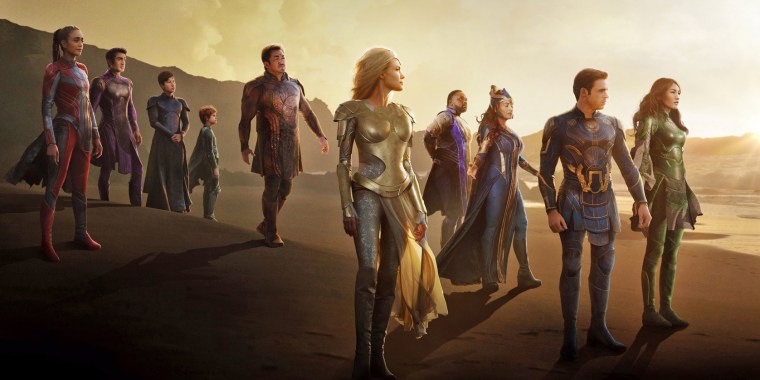Superheroes are a silly concept. If you had the ability to shrink anything, like Ant-Man does, would you spend your time fighting villains? Or would you revolutionize transportation and storage worldwide? If you have basically infinite strength and speed like Superman, why not generate massive amounts of clean energy rather than foil bank robberies? Superpowers could transform life on earth for the better in countless ways. But instead, they engage in empty-headed adventures to keep everything exactly the same.
Superpowers could transform life on earth for the better in countless ways. But instead, they engage in empty-headed adventures to keep everything exactly the same.
Chloé Zhao’s film “The Eternals” is that rare superhero blockbuster which is aware its premise makes no sense. Its heroes openly wonder why they’re wasting their time fighting ancient monsters. Sadly, they eventually forget their own critique and go back to their old heroic ways — because that’s what you give your superhero fans when they’ve paid to see a superhero movie.
“The Eternals” of the title refers to a group of superpowered, ageless heroes sent from space to Earth more than 7,000 years ago by the cosmic-powered Celestials. Refreshingly, these heroes are not all white, heterosexual, able-bodied men. But in other respects they are quite traditional. Their mission is to destroy the Deviants: oozing, dinosaurlike monster things that have attacked and eaten humans throughout millennia.
When you live for centuries, you have a lot of time to question your life choices. Many of the Eternals do in fact wonder why, given how much good they could do, they’re restricted to fighting one particular group of bad guys (or creatures).
Phastos (Brian Tyree Henry) is a superinventor, who gets giddy at the idea of bronze-age humans can be taught to build steam engines. Druig (Barry Keoghan), who can control human minds, protests in frustration that he could end war and genocide if given the opportunity. These arguments continue into the present day, as one human wonders why the Eternals didn’t help Earth’s other superheroes fight Thanos in previous Marvel movies. If they could have prevented him from destroying half the people in the universe, shouldn’t they have done that?
Ajak (Salma Hayek), the leader of the Eternals, has super healing powers and a string of glib answers to these concerns. Most seem cribbed from the “Prime Directive” guiding principles of "Star Trek." It’s important not to interfere in human development, she insists. Humans need to follow their own path.
None of this is convincing — and the film, surprisingly, admits as much. It’s impossible to go into the exact plot machinations without a ton of spoilers, but suffice to say the Eternals’ goals are not what they seem at first. Much of their backstory is an elaborate ruse. Ajak’s rationale for their mission’s limits doesn’t make a lot of sense because it’s not the real rationale.
The meta-critique here is quite intentional. One of the Eternals, Kingo (Kumail Nanjiani) spends much of the movie filming his friends and their battles. Segments of the film effectively turn into a mockumentary. “We need action sequences!” Kingo’s cameraman and valet exclaims during a de rigeur Deviant attack. The film tells you it’s deploying pointless superhero tropes as it deploys pointless superhero tropes.
In this context, the film’s many weaknesses almost become a kind of elaborate parody.
In this context, the film’s many weaknesses almost become a kind of elaborate parody. The underdeveloped characters are a commentary on the typically paper-thin characterization in superhero films. The underwhelming computer-generated image effects underline the unconvincing world-building. The narrative’s wild vacillations and deus ex machina resolutions show the genre’s helpless contrivance. Even the film’s repeated, tasteless use of various genocides to give the characters something to emote about can be seen as a kind of bleak joke about superhero shallowness. The film even half encourages you to root for the Deviants.
Unfortunately, while the film flirts with self-awareness, it ends up dutifully fulfilling audience expectations. The moral arguments about ending wars or advancing technology or changing the world for the better are tabled in favor of remarkably noncompelling disputes about which monsters to fight. (The answer is all of them, if you were wondering.) And the post credits sequences tie the Eternals more closely to the rest of the Marvel Cinematic Universe, promising that, despite their confusing past, they’ll be incorporated into standard superheroing going forward.
This triumph of genre default can seem inevitable. But it really doesn’t have to be. To name just two fairly successful examples, “The Boys” on Amazon and Robert Kirkman’s “Invincible” comic series are both effectively skeptical of standard superhero expectations around violence and defending the status quo.
“The Eternals” is a superhero movie in which the point is that the superheroes aren’t superheroes. It starts to explore that contradiction, and then backpedals furiously to familiar ground. No doubt many fans will be delighted. But at this point, the MCU formula has been recycled so often that sitting through these movies starts to feel eternal.


